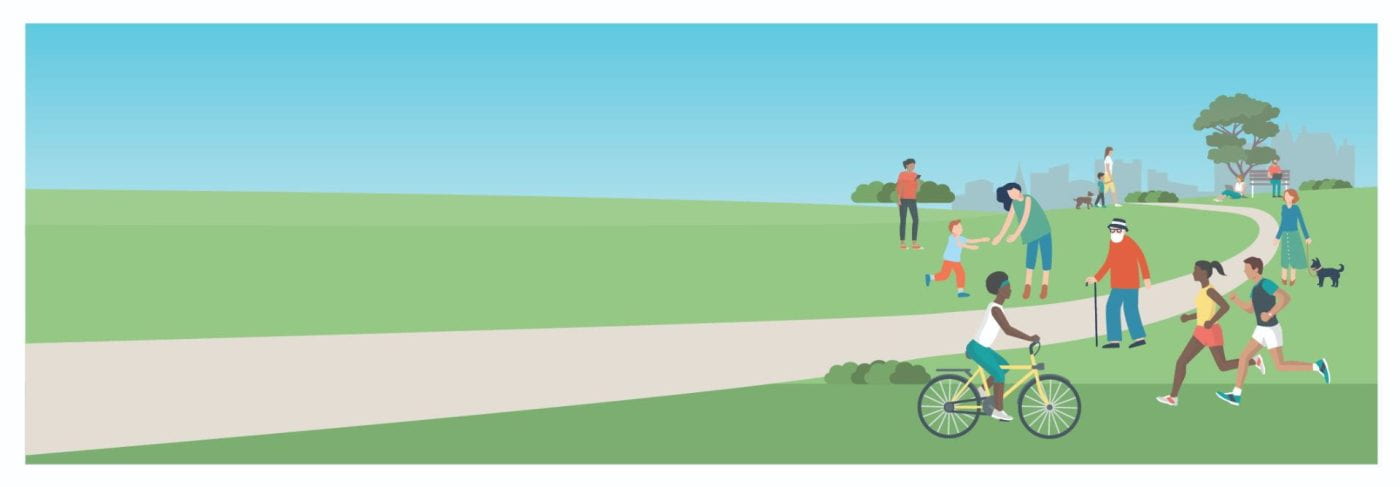How can sharing research findings support the implementation of a new vaccine policy? This is what we wanted to explore in our workshops with parents and healthcare workers, to understand their information needs ahead of the upcoming introduction of the chickenpox vaccine to the UK childhood vaccination schedule.
How is vaccine policy decided?
In the UK the Joint Committee on Vaccination and Immunisation (JCVI) recommend which vaccines should be offered routinely through the National Health Service. These recommendations are influenced by evidence generated through activities such as national surveillance programmes and academic research.

Knowledge mobilisation (KM)
Vaccine related academic research may inform any part of the evidence-based policy cycle (figure 1). For policy-based research to have its intended impact then it needs to be shared with those who can use the findings to inform which vaccines we use and how they are offered. Incorporating KM into a research plan is therefore critical to ensure the best value for time and money from a research project. KM activity may sometimes be aimed at policy makers, for example the JCVI, but in our KM Catalyst Award workshops we wanted to explore how research findings could also influence the implementation of the policy.
How did the JCVI decide to recommend a chickenpox vaccine?
In November 2023, the JCVI recommended that a vaccine against chickenpox be introduced into the routine childhood vaccination programme. The JCVI took different types of evidence into account to make this decision. This evidence included new research on the rates of hospital attendance because of chickenpox, the impact of chickenpox on children and their families and whether it was value for money. The chickenpox vaccine has been used for many years in the US, and Australia therefore experience and information from these countries also helped inform the recommendation.
The Bristol QualPox study
The new information about hospital attendance because of chickenpox and its impact on children and their families was generated by research conducted in Bristol. The QualPox study investigated how many children were seen in the emergency department or admitted to Bristol Children’s Hospital with chickenpox or related complications. Children and families who were admitted were asked to complete a series of quality-of-life questionnaires that provided insight into the immediate and longer impact that chickenpox had on them. The QualPox study concluded that complications from severe chickenpox were common, costly and placed a burden on health services. Even without severe complications, young children and those with underlying medical conditions, sometimes still required hospital admission. The study showed that out of the 130 families followed 405 days were missed from work by the primary care giver and 123 days of work were missed by the secondary care giver (figure 2). The missed work days were of course in addition to the many more days of school that the children missed.
Workshops to share knowledge to support vaccine uptake
We wanted to know whether sharing the information from the QualPox study would be useful for healthcare workers (HCWs) who offer vaccines and to support vaccine related decisions made by parents. To discuss this question, we ran two online focus groups, one with HCWs and one with parents to consider:
- Whether it would be useful to share the findings that led to the policy decision
- What were the best ways to share the findings?
Parents’ Views

Most of the parents we spoke had already got their children vaccinated (privately) against chickenpox as they had experience of seeing children unwell with chickenpox, had seen an announcement in the press about the recommendation for vaccination back in 2023, or heard that about the vaccination programme in other countries. One parent had experienced chickenpox as a normal rite of passage, and one had no previous knowledge.
All parents thought that providing a clear reason for the introduction of a new vaccine was important. Providing such information on trusted sites like NHS sites and actively promoting the vaccine could mean that people did not have to look for alternative sources of information. Hearing more about the complications of chickenpox especially from families who had experienced problems was thought to be a useful way of highlighting the benefit of having the vaccine.
Healthcare workers’ Views
The healthcare workers included nurses working in vaccination, a general practitioner, other general practice staff involved in vaccination and a paediatrician. As a group they wanted as much information as possible and had lots of unanswered questions. They were also keen to have resources to raise awareness of the new vaccination amongst parents. This group also thought that personal stories would be a powerful way to share information about why the vaccine was needed. The group suggested that these stories could be shared as short films or clips that could be shown in GP surgery waiting areas or on social media
Getting behind the numbers – Next Steps
The KM Catalyst Award workshops with parents and healthcare workers gave us insights into the information these groups would need to support successful implementation of the chickenpox vaccine. We plan to present these learnings at a future Bristol Immunisations Group Health Integration Team (BIG HIT) meeting. The insights will also inform the creation of short films featuring families who shared their experiences of the impacts of chickenpox during the QualPox study and we are hoping to recruit a PhD student to carry out further research on this topic.
By Rajeka Lazarus and Harriet Fisher
Dr Lazarus is a Consultant Senior Lecturer in Infectious Diseases & Vaccinology, Bristol Medical School (PHS)
Dr Fisher is a Research Fellow, Bristol Medical School (PHS)

